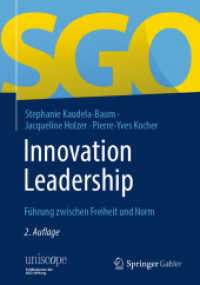- ホーム
- > 洋書
- > 英文書
- > Business / Economics
Full Description
This timely Handbook provides a conceptual discussion and a wide empirical presentation of new disruptive forms of innovation producing appropriate technologies, addressing the needs of low-income populations, and providing alternative solutions for sustainable development.
The Handbook of Innovation & Appropriate Technologies for International Development expertly analyses and compares contributions of appropriate technologies in developing, emerging and industrialized economies, including China and India, and their global development impacts. Additionally, it covers the transversal role of new international communication technologies, open access, digital tools as well as entrepreneurship and innovation from within emerging economies and in industrialized nations. Using empirical analyses of cases and experiences in manufacturing sectors and services, it covers both the formal and informal economy, and provides an insightful focus on differences and similarities across borders and sectors.
NGO and private sector practitioners, public sector officers as well as academics specialized in development economics, entrepreneurship and engineering or management studies will find this Handbook to be illuminating and very informative. Science and technology producers and entrepreneurs will appreciate the global look into more sustainable development as related to appropriate technologies, and how they can be used across all economic backgrounds.
Contents
Contents:
Introduction to the Handbook of Innovation & Appropriate Technologies for
International Development xiv
Daniel Frey, Samuel Pierre, Philippe Régnier, Koshy Varghese and Pascal Wild
PART I APPROPRIATE TECHNOLOGY: ORIGINS AND
EVOLUTION OF A CONCEPT
1 Revisiting the concept of "technology for the people": from Gandhi and
Schumacher to 21st century new developments 2
Philippe Régnier and Pascal Wild
2 MIT D-Lab: designing for a more equitable world 7
Amy Smith and Nancy Adams
3 Solving problems and strengthening systems: how local innovation of
appropriate technology contributes to development 22
Elizabeth Hoffecker and Boru Douthwaite
PART II THE RISE OF EMERGING ECONOMIES AND NEW CONTRIBUTIONS
4 The rise of emerging economies: implications on appropriate
technology development in theory and practice 47
Philippe Régnier and Pascal Wild
5 Entrepreneurship, appropriate technologies and economic development
in China 54
Heini Shi
6 Technological transformation in India: the debate between appropriate
and frontier technologies 71
Binod Khadria and Ratnam Mishra
PART III RECENT INNOVATIONS AND APPROPRIATE
TECHNOLOGIES IN TRANSFORMATION
7 Technology evaluation for global development: exploring the efficiency
of comparative methods 87
Daniel Frey and Bish Sanyal
8 Mobilizing higher education and research toward engineering for global
development: the approach taken by the Centre for Global Engineering 103
Ahmed Mahmoud, Amy Bilton, Morris Huang, Levente Diosady and Yu-Ling Cheng
9 The participatory design spectrum: design for, with, and by 125
Kendra Leith, Sher Vogel and Khanjan Mehta
10 Frugal engineering 140
Rao Balkrishna
11 Financial technologies and rapid development growth in emerging economies 154
Jane Khayesi
12 Openness and new development perspectives 168
Abdelhamid Benhmade
13 How technologies can be used to reduce poverty and promote
sustainable development in Haiti: the case of the PIGraN Project 187
Samuel Pierre
14 Ethical considerations for "Internet of Things" in research to advance
global development 207
Daniel Sweeney, Amit Gandhi and Evan Thomas
15 High-stake conditions to catalyse local sustainable development
through Fablabs in Africa 222
Thomas Hervé Mboa Nkoudou
16 The importance of local institutions: bottom-up innovation in Uganda 240
Joe Amick and Roy William Mayega
17 How locally adapted information and communication technologies
(ICTs) may contribute to the citizens' socio-economic conditions in
emerging countries: case study in the DR Congo 259
Musandji Fuamba
Index








